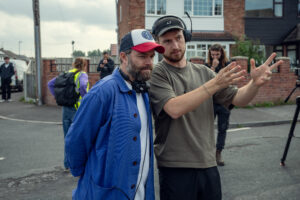Audiences were not ready for the intense emotion that came from Netflix’s Adolescence. For some viewers, it transported them to when they were teenagers, and it made others worry about how children and young adults consume media online and how that affects conversations and interactions in real life. Are these children all right? Director Philip Barantini has crafted, to put it quite simply, one of the most important televisions series of this current moment.
After Barantini and I started chatting, I admitted Adolescence‘s imagery stayed with me in a very unexpected, specific way. I can hear the pitch of Jamie Miller’s anger and I can hear the voice of his father, Eddie, resisting to tremble as he keeps his cool with his family after an embarrassing ordeal in the finale. The eyes of Erin Doherty’s Briony have stuck with me the most, I think. Now that the frenzy of Adolescence‘s release has died down, I wondered how Barantini looks at its development and filming.
“I try to put absolutely everything into every project,” Barantini says. “When we were in it and making it, casting, and filming, you can get wrapped up in it, and you can read the script a thousand times. You can feel like you’re in a bubble when you’re making it, and even small wins, like when we got the drone to take off and then land at the end of the second episode, it can be a huge relief. At the same time, especially with a show like this, you are worried about the young actors and if they are okay. We had psychologists on set all the time with chaperones to make sure everyone was safe and that they weren’t getting affected by all of it. I get so nervous when something comes out, because you are sending your child out into the world. The day after it came out, we heard there were a lot of views for it, and it’s been constant since then. We make this little show in Yorkshire as a family, and I say that because we truly became so close. My mind is blown. I’m so grateful for the reception of it.”

I have had many conversations with people my age about how they dealt with things like bullying and mental illness when they were younger. We didn’t even say the phrase, “mental illness” commonly in the early 2000s, and it hints that while there have been many advancements in our tolerance of one another, there’s still so much we need to do. I joked with the director that you could not pay me to be a teenager in high school again.
“I would agree,” he says, plainly. “Jack [Thorne] dove much deeper than Stephen [Graham] and I did, but we would talk a lot about male rage and the rage that we have felt in our lives and what we experienced in our upbringings. It was like therapy in a way. But it also gave us an understanding of what these teenagers are going through today. I will be 45 this year, and back then, if you got into an argument with someone, you would go home and forget about it. Then you come back the next day…maybe you talk about it, maybe you don’t. Now it’s constant, because it’s on social media. We are constantly on Snapchat, WhatsApp or whatever new app is out. You can’t escape it. Even if you aren’t on the platforms, it follow you. It’s so scary to me.”
Anger is a theme discussed in various ways throughout Jamie’s ordeal. Are we conscious of it? Where do we think it comes from? Does Jamie feel anger towards women, and, if so, where does he think that comes from? Barantini tells me about the first time that Owen Cooper reached inside himself to tap into the fury lurking inside his young character.
“Owen [Cooper] went through such a long process of auditions, but when we got to set, we rehearsed episode three,” Barantini says. “We shot that one first, and Owen is not an angry kid. He’s so chill, and I don’t think he’s expressed or experienced that rage before. I was pushing him and trying to get it out of him, and, all of a sudden, a switch flipped. I don’t know what happened, but he just lost it to the point where he almost had a panic attack. That scared him. We went outside, and I told him how actors train for years and years and they never get to that place and we had a laugh after everything calmed down. I knew that he would be able to control that anger when we went back to that moment.
I think kids feed off energy, and I think if Eddie’s been that person. He’s not an abusive father, but he may have slight anger issues when he’s watching football–normal things. He will shout at the TV or get really mad, but maybe Jamie fed off of that and it’s built something inside of him. At that age, your body is changing and testosterone levels are bubbling. I remember being his age and that anger came out of me at the dumbest things. It felt massive at the time, and it felt like the worst moment of my life was always happening.”
Adolescence is streaming now on Netflix.









